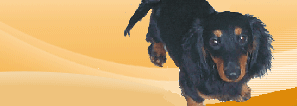|
|
|
|
What Can You do For a Teething Puppy?
Toy puppies will not be able to chew their way through a whole lot of surfaces, but they can chew at irreplaceable furniture and moldings enough to do quite a bit of damage. Be sure to puppy-proof your home before the curious, mischievous and “teething” toy puppy arrives.
Electrical cords and wires are especially hazardous to teething toy puppies. They need to be out of reach or taped to walls. A puppy could electrocute himself while happily chewing away on an electrical cord. Regularly look for dropped pens, pencils, rubber bands, paper clips, and children’s small toys on your floor. Teething puppies can be very mouthy, chewing on everything they can latch onto. Nylabones and other chew toys are an absolute must for your new teething toy puppy.
You can also ask your vet for oral cleansing gel to apply topically for control of bacteria and aid in healing injured or sore gums while puppies are teething.
Don’t forget to keep your books, shoes and clothing out of harm’s way of a teething puppy. Crate the puppy when you’re out of the house or confine him in a safe area with all his appropriate chew bones and toys.
If you catch your puppy chewing something inappropriate, sternly say “NO,” and give your puppy an appropriate chew bone or toy. Praise him when he begins to chew on the appropriate item.
Bitter-tasting liquids are very helpful to apply to your furniture and handy to use on a bandage after a veterinary procedure to keep dogs and puppies from chewing the bandage.
When the permanent teeth begin to erupt, provide your toy puppy with an appropriate chew toy, something that is soft and that is not going to be swallowed and cause intestinal blockages. Choose an assortment of toys of all textures. In fact, dogs need to chew throughout their lives. It is wise to provide your adult toy dog with plenty of chew toys and bones that are soft and hard. Select items that are the right size for your toy breed puppy or dog. Choose carefully because some of the toys on the market might be just a little too hard for a toy breed. Avoid cow hooves with sharp edges. Broken teeth and sliced gums can be a real problem for dogs and puppies who chew on processed cow hooves. Some vet dental consultants think toys that look like stringy dental floss are like chewing on a rag and can be loaded with harmful bacteria when they get dirty. Wash your toy puppy’s toys often in the washer along with their other belongings and use Clorox bleach in the wash.
Also avoid rawhide strips or rawhide of any kind.
 |
 |
 |
 |
 |
 |
COPYRIGHT 2002 DoggiesWorld.com
|
|
|



